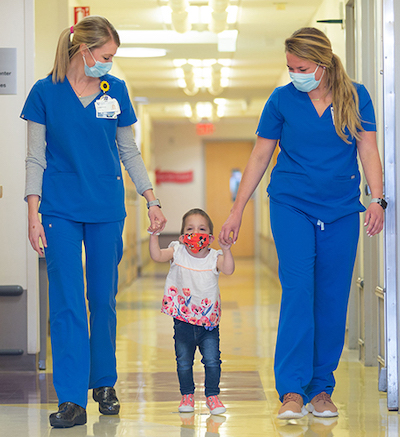
In 1990, Joanne Kurtzberg, MD, Jerome S. Harris Distinguished Professor of Pediatrics, with support from Samuel L. Katz, MD, Wilbert C. Davison Distinguished Professor and Chair Emeritus of the Department of Pediatrics, established the Duke Pediatric Blood and Marrow Transplant program. Dr. Kurtzberg performed the world’s first unrelated cord blood transplant in 1993 at Duke. This innovation filled a significant unmet need for stem cell donors for children and young adults who did not have a match in the family or in the donor registries. Duke published a number of landmark papers in top scientific journals establishing the utility of umbilical cord blood transplantation in the treatment of children with malignant and non-malignant diseases.
Under the leadership of Vinod Prasad, MBBS, professor of pediatrics, and Dr. Kurtzberg, the program, which was recently renamed the Duke Division of Pediatric Transplant and Cellular Therapy (PTCT), has grown and is currently recognized as an internationally-renowned center of excellence for patients with rare inherited metabolic diseases, such as Krabbe, adrenoleukodystrophy (ALD), Batten and metachromatic leukodystrophy, among many others.
In 2015, under the leadership of Paul L Martin, MD, PhD, professor of pediatrics, and Timothy Driscoll, MD, associate professor of pediatrics, the division initiated the use of engineered CAR-T cells to treat pediatric acute lymphoblastic leukemia. The study enrolled 8 patients in a clinical trial that led to the first approved cellular immunotherapy for pediatric leukemia. Duke is an established, FDA-approved center for CAR-T therapy offering the greatest pediatric experience in the Southeast region.
In 2018, Dr. Kurtzberg established and became director of the Marcus Center for Cellular Cures (MC3). This center has pioneered the use of cellular products derived from cord blood and mesenchymal cells for the treatment of a broad range of cerebral palsy, autism, stroke and related brain injuries.
In 2023, under the leadership of Kris M. Mahadeo, MD, MPH, professor of pediatrics, the division expanded its clinical and research portfolio. Dr. Jennifer Jaroscak works with the faculty and dedicated multi-disciplinary staff to offer approved standard of care gene therapy treatment options for patients with sickle cell disease and thalassemia; Dr. Paige DePriest leads clinical trials in T-cell leukemia and high risk hematologic malignancies; Dr. Kris Mahadeo leads research trials in autoimmunity, solid tumors and primary immune deficiencies and leads a comprehensive multi-disciplinary PTCT Survivorship program; and Dr. Carmem Bonfim leads a comprehensive inherited bone marrow failure program.
Drs. Bonfim, DePriest, Driscoll, Jaroscak, Kurtzberg and Mahadeo, who possess an average of more than 25 years of transplant experience each, have led many groundbreaking trials involving novel transplant protocols, progenitor augmentation techniques, anti-viral and anti-fungal agents, cell therapy products, and veno-occlusive disease (VOD) therapy among others and have presented the results of their research and clinical experiences at numerous venues throughout the world.
Today, the Division of Pediatric Transplant and Cell Therapy continues to lead advances in cellular and gene therapy with innovative approaches for children with both malignant and non-malignant diseases, including unrelated cord blood transplant, haplo-identical transplant, gene therapy and use of multiple cellular therapies.